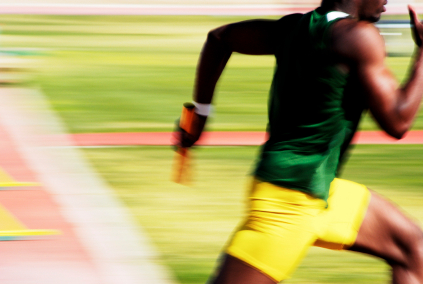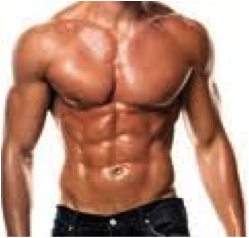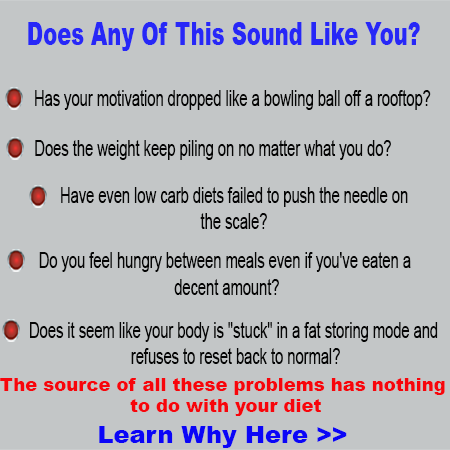


No shortcuts or cheap imitations.
Plus toll-free telephone orders, too!
Here's What Happens To Your Metabolism, Body Fat, and Muscles When You Stop Working Out (Study of Twins)
By Kevin DiDonato MS, CES--Level 1 Certified Precision Nutrition and Certified Personal Trainer
 Exercise is extremely important for your health.
Exercise is extremely important for your health.
But there may not be a whole lot of people who are doing it…
Simply because they are unmotivated…
It feels like work…
People relate exercise to not being fun.
Do you fall under this category?
Well, I have some news for you…
If you have been an avid exerciser, and you suddenly quit, then some pretty drastic changes may occur in your body – and your brain!
Exercise or Not: That Is the Question
Exercise does wonders for your body. It helps to tone and strengthen muscles…
May help to strip away ugly belly fat…
Helps to strengthen your cardiovascular system (i.e., your heart and lungs)…
Helps lower blood pressure and cholesterol…
Changes brain chemistry by releasing neurotransmitters that improve everything from concentration to mood and memory…
And may have positive effects on your metabolism!
But things change…
Family pressure and stress, work obligations, or simple boredom with your exercise routine may lead you to quit the program in order to “take a break.”
But what happens when you stop working out?
Well, there may be drastic changes to your overall body – including your metabolism, fat stores, hormone levels, and of
course, your muscle mass.
In fact, a recent study shows the dramatic effects that quitting exercise could have on your body.
 Danish researchers took 10 sets of identical twins – that hold the same DNA – and assigned one of the twins to an exercise group (two or more exercise sessions per week) and the other twin was assigned to a non-exercise group (less than one time per week).
Danish researchers took 10 sets of identical twins – that hold the same DNA – and assigned one of the twins to an exercise group (two or more exercise sessions per week) and the other twin was assigned to a non-exercise group (less than one time per week).
The results were amazing!
The twins in the exercise group showed less body fat (20 compared to 24), better overall body endurance, and they were more sensitive to insulin.
The twin that didn’t work out, one average, weighed SEVEN pounds more than the exercising twin, had less endurance, and may have showed the early signs of insulin resistance (or other metabolic health changes).
But here’s the big take away:
The group of twins who exercised had more gray matter in their brain compared to the non-exercising twins.
This could signify changes in brain health due to lack of exercise or physical activity.
And guess what? The twins in the study just recently became inactive, which could mean that when you quit exercising, the changes may start immediately in your body.
The researchers concluded: “Among healthy adult male twins in their mid-30s, a greater level of physical activity is associated with improved glucose homeostasis and modulation of striatum and prefrontal cortex gray matter volume, independent of genetic background. The findings may contribute to later reduced risk of type 2 diabetes and mobility limitations.”
Take Home Message
If you have ever thought about quitting your exercise program – don’t!
A new study shows that quitting exercise may lead to weight gain, metabolic changes, and brain structure changes, which could lead to issues with your health.
Not only that, but your muscles may start to break down, and damage could start to occur to your organs and other cells within days, weeks, or months of not exercising.
This could lead to changes in your body, metabolism, and ability to lose fat.
So, next time you want to skip that workout, think twice about it!
Reference:
Rottensteiner M, Leskinen T, Niskanen E, Aaltonen S, Mutikainen S, Wikgren J, Heikidla K, Kovanen V, Kainulainen H, Kaprio J, Tarkka IM, Kuiala UM. Physical activity, fitness, g;lucose homeostasis, and brain morphology in twins. Med Sci Sports Exerc. 2015 Mar;47(3):509-18.
 If you order a JayLabPro SmartShip product or any Combo Package, we will automatically ship you a new supply of the product or products you have ordered every month, starting 30 days after your initial order is shipped, and continuing until you cancel. The credit card you are using today will be billed the lowest available price for those product or products when your order is shipped, but shipping will be FREE. You may log into your customer account or call our customer service department toll-free at 1-888-9GETPRO (1-888-943-8776) between the hours of 8am – 9pm EST Mon-Fri to cancel future shipments, customize the timing of your shipments, or change the credit card used for billing.
If you order a JayLabPro SmartShip product or any Combo Package, we will automatically ship you a new supply of the product or products you have ordered every month, starting 30 days after your initial order is shipped, and continuing until you cancel. The credit card you are using today will be billed the lowest available price for those product or products when your order is shipped, but shipping will be FREE. You may log into your customer account or call our customer service department toll-free at 1-888-9GETPRO (1-888-943-8776) between the hours of 8am – 9pm EST Mon-Fri to cancel future shipments, customize the timing of your shipments, or change the credit card used for billing.









